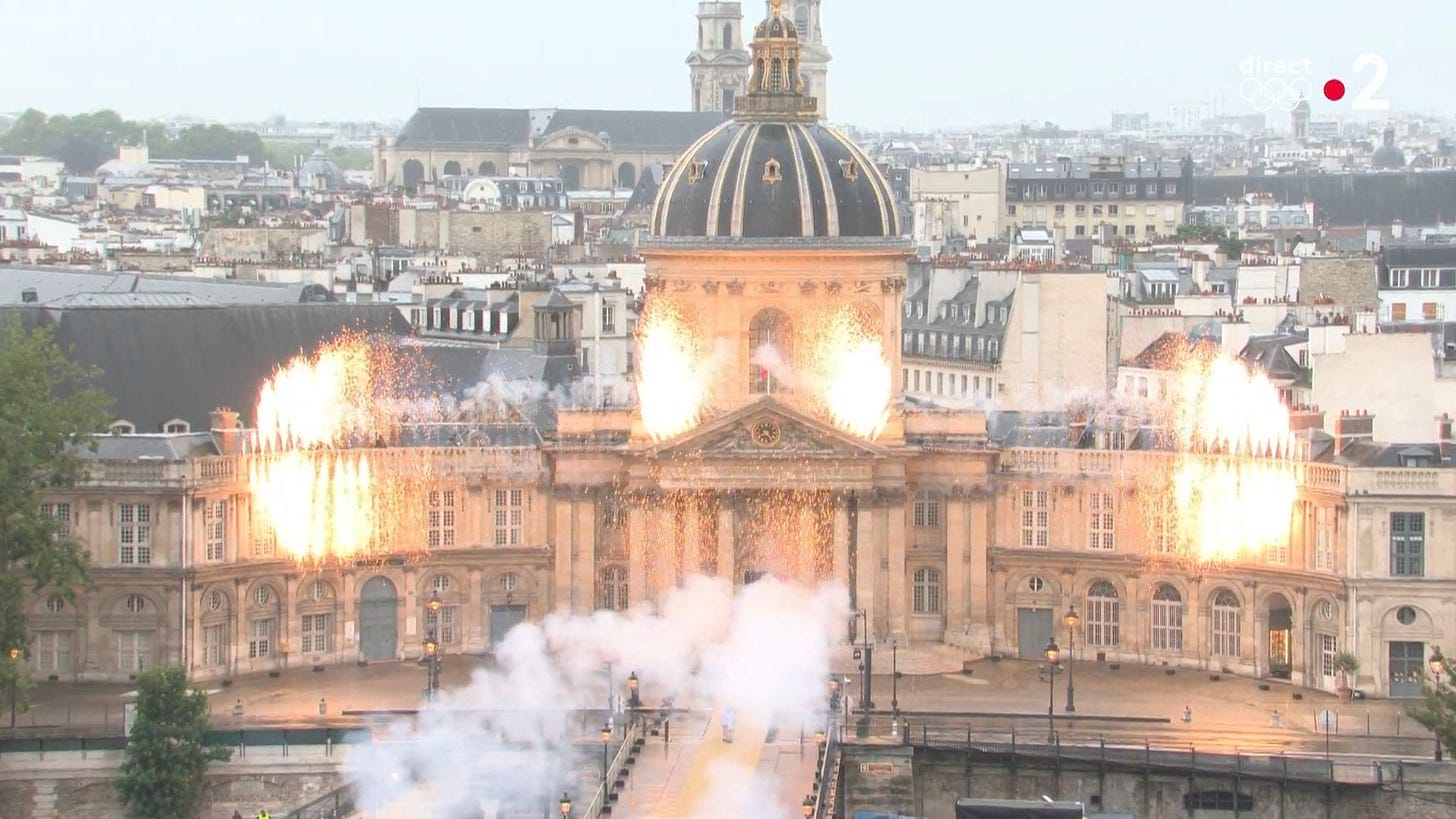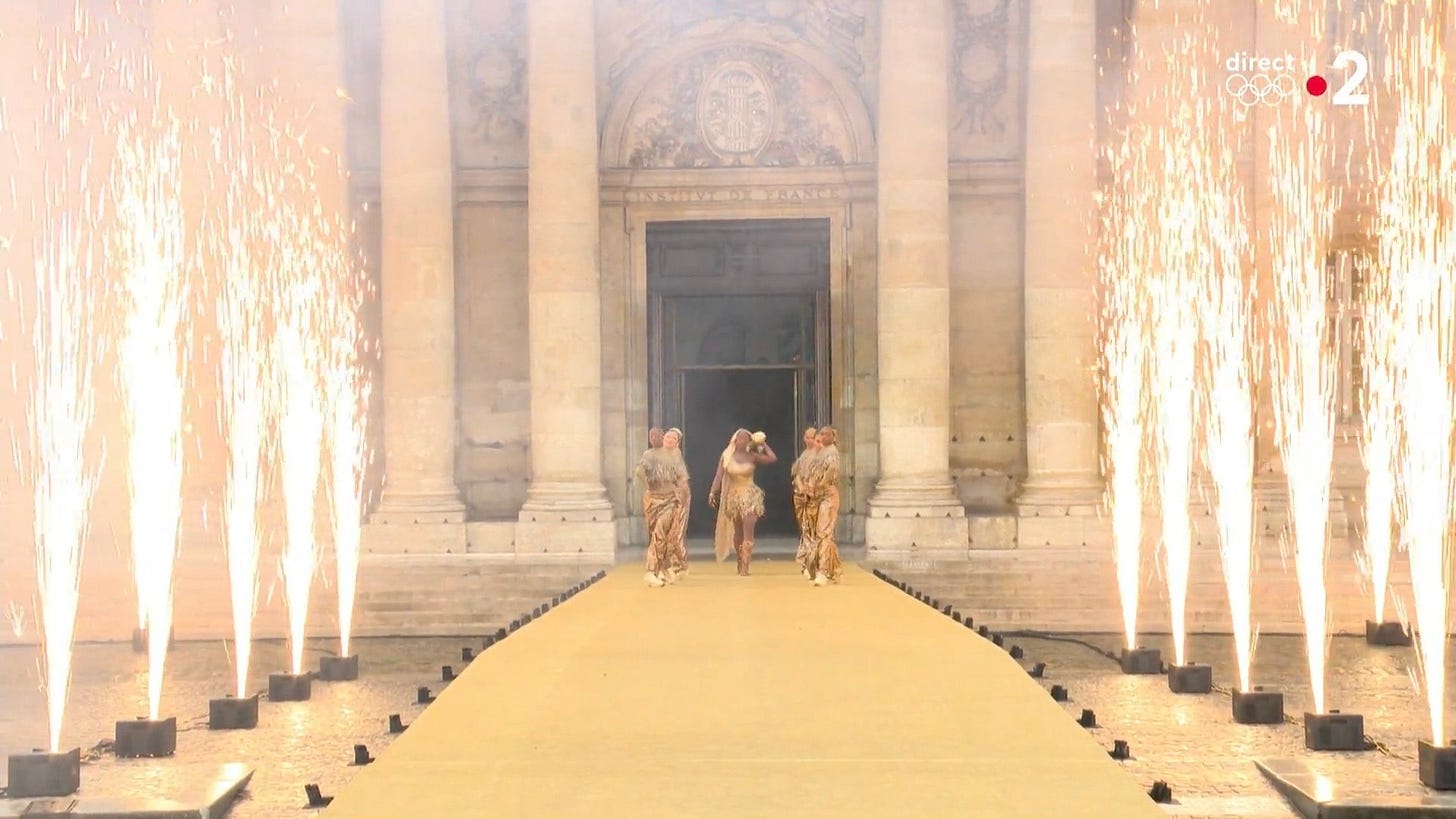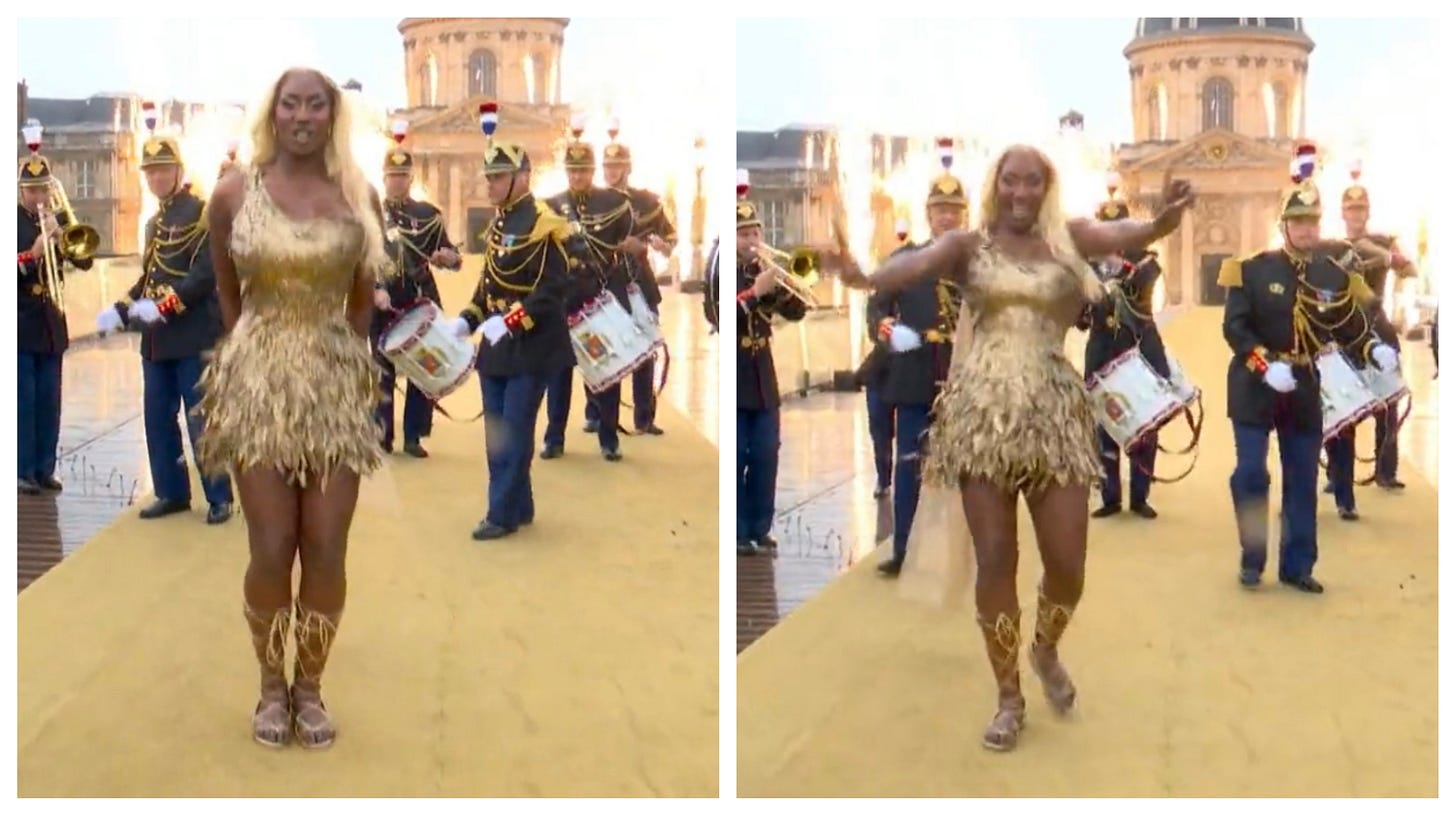“The whole ceremony was very *you*" Part 4: Égalité
You haven't seen a flame-war until you've seen a flame-war about the French language. That night, at the Opening Ceremony, France won.
Égalité (equality) started, like the previous acts, in a very traditional, reassuring way. The Garde Républicaine band is part of the gendarmerie, i.e. a more heavily armed version of the police, and is a symbol of French governmental pomp and circumstance. You may have seen their colleagues on horseback, in shiny parade uniforms: this is no ordinary or fun marching band; this is serious Bastille Day military parade stuff. They were in formation on the Pont des Arts (Bridge of the Arts), right outside the Louvre, playing one of Charles Aznavour’s greatest hits, but in a military manner. Aznavour’s usual jazzy swing vibe just wasn’t there: imagine this choppy, martial delivery applied to a Frank Sinatra song, and you’ll get how French music lovers felt at that moment.
Troll level: academic
Then I realized the shot was not showing the building opposite them: the Institut de France, which contains multiple national academies, some more than 300 years old (i.e. before the first French Republic). The most controversial of the lot is Académie Française, a supposed authority on the French language with neither the legal power nor the actual academic credentials to regulate language. While the Academy of Sciences is made up of scientists who do follow international scientific methods and codes of conduct, the peer-review process etc, the Académie Française is not made up of linguists, but of various types of people with some literary impact, from novelists to journalists to politicians to priests, and they’re mostly old, white men. They are sometimes so bad at linguistics that they misrepresent their subjective judgment calls as eternal, historical truths that actual, professional linguists and historians then have to debunk.
It’s hard to explain to certain nations how attached to their language the French are, how closely they follow its evolution, or how much they police each other about it. Part of it is a national unity imperative: France has no homogeneous ethnic or cultural makeup, and no lifetime ruler thanks to a long series of revolutions. Marseille has more in common with other Mediterranean cities than with Paris; Lille is in Flanders, i.e. culturally Belgian; the Bretons are Celts; Alsatians are both geographically, culturally, and religiously closer to Germany than to Paris; and differences are further magnified for islands like Corsica, La Réunion etc. A key component of French Republican unity was only achieved in the 19th century thanks to free, secular and mandatory schooling, in French. These schools violently repressed regional languages, forbidding pupils from speaking them even during recess, equating speaking Breton, for example, with spitting on the floor and spreading tuberculosis.
At the global level, French used to be a universal language spoken by the world elites, but the French know full well that English has since taken over. I already explained what this meant for representations of the French revolution, but this is a constant issue of soft power. The French know that Anglophones, especially Americans, influence the world through English-speaking media, so they want to counter that influence anywhere they can: by insisting on French still being used in international organizations and events like the Olympics, by imposing quotas of Francophone songs on the French radio (irrespective of nationality of the singer), and by implementing exception culturelle in international trade agreements: cultural goods like books or films should not be treated in the same way as oil, sausages or solar panels.
French people will correct each other’s spelling, syntax or grammar mistakes not only to complete strangers online, but also during family dinners. Just today, I was called “grotesque” by some rando on the internet because Facebook turned my name, “Comte de Saint-Germain” into “Comte De Saint-Germain”. Was I annoyed when Facebook first displayed “De” instead of “de”, because I know “de” is meant to be lowercase in nobility titles? Yes. Would I insult someone else over it? No, but as you can see, some French people think this is a valuable use of everyone’s time and energy. Some managers will even pause a work meeting over the use of a specific tense; journalists will make fun of accents in ways that would be considered rude in most countries; you get the idea. As confirmed by many of my followers in heart-wrenching DMs, this French attitude towards language actually discourages people from learning it: not only can the linguistic rules be tricky, but people are often assholes about it. So when someone like Aya Nakamura gets playful with language, all hell breaks loose.
Over the past five decades, a major focus of Académie Française has been its crusade against franglais, the use of English words “infecting” French sentences. So the Académie made up French words that nobody uses: when Parisians leave the city on Friday night and come back on Sunday night, they go “en weekend” not “en vacancelles”. Even Québecois French is usually so much better than Académie Française French: courriel makes sense: it’s short for courrier électroniqnue, like email is short for electronic mail. But the académie came up with mèl which managed to be both ugly and meaningless. Therefore the Aznavour song was an excellent troll: it was full of franglais (see excerpt below), but dated back to 1963, and was therefore part of the cultural references of the very same old bourgeois that get riled up over an uppercase “de”:
You are the one for me
Formidable [Note this means “wonderful” in French, not formidable]
You are my love, very
Véritable
Et je voudrais pouvoir un jour enfin te le dire [and I wish I could one day tell you]
Te l'écrire [write you]
Dans la langue de Shakespeare [in Shakespeare’s language -a common turn of phrase to say “in English”]
My daisy
Désirable
Je suis malheureux [I am unhappy]
D'avoir si peu de mots [to have so few words]
À t'offrir en cadeau [to offer you as gifts]
Being a former banker who sees the UK and US as sources of all things cool and innovative, Macron does use franglais quite a bit. But like all conservatives, he is a big fan of the Académie Française as a means of policing thought, expression, and of freezing the French language in a fantasized, homogeneous, glorious form it never actually had. Policing language is a both a very convenient way to preserve rich elites who can afford private tutoring, and a very convenient way to preserve the patriarchy while we’re at it. Macron supported the Académie’s fight against gender inclusive writing, repeating the fallacy that the masculine had always taken priority over the feminine, and that masculine represented both genders so it was neutral, really. Therefore, the presence of one man in a group of hundred women makes that group “ils”, i.e. the masculine “they”. And don’t you dare use a majority rule, which would give “elles”, i.e. the feminine “they”. Or worse, don’t you dare use “iels” a neutral “they” combining “ils” and “elles”, acknowledging presence of both genders in the group.
But during the ceremony, the Academy was about to get blown up: the torchbearer appeared, and basically lit up the building with fireworks. Academicians are people that are so ensconced in centuries-old privileges that they are one of the reasons the path of metro line 4 is so messed up. They just refused to have a metro line pass under their building, as the construction work and vibrations would be too much of a distraction from their oh-so-important work. So I can only imagine how the fireworks felt… but the loudest bang was yet to happen.
Trolling level: super heroic
As most content of the opening ceremony was kept a surprise, speculation had been running rampant about who would actually perform. Months before the ceremony, when Emmanuel Macron mentioned that Franco-Malian singer Aya Nakamura could potentially sing Edith Piaf covers, reactions were 3-fold:
some people were enthusiastic, and saw it as very fitting because Piaf used to be the most listened to French singer outside of France, and Nakamura broke her record
some on the Left asked why Nakamura couldn’t sing her own songs, and why young French people of colour always had to cover old-timey, white classics. Why should assimilation be a requirement for national recognition?
the Far Right just went completely ballistic with racist insults against Nakamura. She had had to endure misogynoir for her entire career, but her potential participation took the attacks to the next level. This even materialized physically, with white nationalists holding a banner saying “There’s no way Aya, this is Paris, not Bamako’s marketplace” on a bank of the Seine.
Apart from insults focusing on her physique and origins, detractors who denied any hint of racism claimed “she didn’t actually sing in French”. They just couldn’t deal with the fact that Nakamura uses not only franglais, but also recent slang that old people don’t get, and sometimes sentences that use only French words, but assembled in a way that is unfamiliar to old, non-urban French people. “J’ai vu dans ça” means “I saw right through it”, but most people who are not familiar with this Côte d’Ivoire expression will be confused by this sentence that only seems to say “I saw in it”. In the 1990s, French rappers, from hardcore Suprême NTM to easy listening MC Solaar used a lot of slang, from verlan to classic French gangster slang, to Arabic words that were assimilated into French. But they made a point of combining it with more classical stylistic poetic flourishes, using traditionally complex vocabulary as a means to say “see, we master both language registers, this is true French poetry”. Aya Nakamura doesn’t bother with the latter part. She is not a rapper, but she knows hip-hop well, is a judge on a hip-hop TV program, and reuses some of the codes of hip-hop in her performances, such as saying her own name at the beginning of songs. She did just that at the beginning of her appearance in Egalité, to make it very clear that yes, it was her coming out of the academy on fire, and nobody else.
Picking Aznavour was very smart, because it avoided any direct comparison with Edith Piaf (someone else would tackle that later on in the ceremony), but it still connected Nakamura to a singer who is both monument of a French chanson and the son of immigrants who always kept honoring his Armenian origins, i.e. didn’t prioritize assimilation over recognition.
Lyrics matter
From medieval poets to rappers, French song lyrics are not just about proper grammar or vocabulary, but also about displays of penmanship that fit a very specific theme, if possible an original one. This is way more important in France than say, in US pop culture, where rhyming “together” and “forever” in yet another bland love song seems no issue. And in terms of theme, Aznavour’s 1963 franglais lyrics were just a perfect fit for Nakamura’s 2024 performance:
You are the one for me
Formidable
But how can you see me
Si minable [so pathetic]
Je ferais mieux d'aller choisir mon vocabulaire [I’d better go pick my vocabulary]
Chérie, pour te plaire [to please you darling]
Dans la langue de Molière [in Molière’s language, a common turn of phrase to say “in French”]
Toi, tes [you, your] eyes,
ton [your ]nose
tes [your] lips adorables
Tu n'as pas compris [you didn’t understand]
Tant pis [ah well]
Ne t'en fais pas [don’t worry]
Viens-t'en dans mes bras [come into my arms]
Darling I love you love you
Et puis le reste on s’en fout [and we don’t give a damn about the rest]
You are the one for me
Formidable
Suddenly, conservatives could not complain anymore about Nakamura singing in franglais: it was Aznavour’s franglais, hence part of the establishment, and she was literally telling them she didn’t care whether they didn’t get it. Even the way she was pronouncing “you aRHe Ze one” instead of “you are the one” was frenchier than the original! This opening song was the perfect linguistic diss, and following a short snippet of North African arabic strings covering Aznavour’s “la bohême”, it flowed effortlessly into Nakamura’s own songs. These songs are all addressing another person, using very specific vocabulary: Aznavour talks to his lover, then Nakamura to a snitch, and then to her lover Djadja. And all these songs also have some teachable vocabulary moments. I personally do not use the word pookie but I do use its balkanic/romani root word poucave, used in French slang for a snitch. Nakamura applied franglais rules to make the now-old poucave more English-sounding (hence cooler), more like a cute nickname: pookie. In this song, it refers more to a gossip, spying on people to later badmouth them. Confidently walking towards law enforcement while talking about a snitch is already awesome, but in this context it’s the ultimate “fuck you” to all those who badmouthed Nakamura for months. When she switched to Djadja, with the Garde Républicaine choir as backup singers, it was particularly enjoyable to hear the words “en catchana baby tu dead ça“, meaning “you’re really good at doggystyle, hun” on global TV. The president of the French Senate (the man who, per the French constitution, would replace Macron should Macron be unable to serve), personally complained about Aya Nakamura’s choice as a performer due to the existence of this particular lyric. Well, it had just been sung to the world.
The Garde Républicaine not only walked towards Nakamura, in a “meet me halfway” symbol, but they also modified their musical playing style, and formed a circle including everyone, from musicians to dancers to perform together, as equals. People may have found the officers’ “dad dancing” funny, but they later confirmed it was a very serious duty for them: they were representing a message of French equality to more than one billion people around the world, and dancing like this was part of the mission brief.
In return, Nakamura and her dancers saluted the soldiers at the end of the performance. You’ll notice the open hand facing forward, which is the proper French military salute, and not the face down salute more often used in the Anglophone word. So there was mutual respect between the old institutions and the young performers. Racists probably had a heart attack, and I burst in tears of joy.
Legacy
It was later revealed by Le Canard Enchaîné that LVMH owner and Olympic sponsor Bernard Arnault tried to get Aya Nakamura banned from the ceremony. Unlike for his vulgar Louis Vuitton product placement, this time he didn’t get his way. After years of Macron’s administration reusing Far Right rhetoric, passing xenophobic laws and enabling the Rassemblement National to get an unprecedented number of MPs , I cannot stress how important this moment of the opening ceremony was for so many French and non-French people. To this day, people in Paris still reenact this performance in countless videos on Pont des Arts, renaming it Pont d’Aya. It’s a much better sign of genuine creativity, equality, love and hope than the supposed “love locks” that actually damage the bridge.
To be continued! If you enjoyed these explanations, please consider purchasing my audio walks here. I share all kinds of stories about unknown parts of Paris, and even if you’re not physically there right now, you can listen to them at home, like a podcast.











This series is just brilliant. The breadth and depth of your knowledge of French culture and history are off the charts. I hope you have a book (or five) in the making??
Wonderful read, as usual, and I learned so much! Merci :)